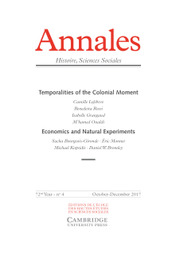Article contents
The Future of the Social Sciences: Between Empiricism and Normativity
Published online by Cambridge University Press: 09 July 2018
Abstract
This article takes a processualist position to identify the current forces conducive to rapid change in the social sciences, of which the most important is the divergence between their empirical and normative dimensions. It argues that this gap between the many and various empirical ontologies we typically use and the much more restricted normative ontology on which we base our moral judgments is problematic. In fact, the majority of social science depends on a “normative contractarianism.” While this ontology is the most widely used basis for normative judgments in the social sciences, it is not really effective when it comes to capturing the normative problems raised by the particularity and historicity of the social process, nor the astonishing diversity of values in the world. The article closes with a call to establish a truly processual foundation for our analysis of the social world, which must move away from contractualism and imagine new ways of founding the human normative project.
- Type
- Social Sciences, Norms, and Temporality
- Information
- Annales. Histoire, Sciences Sociales - English Edition , Volume 71 , Issue 3 , September 2016 , pp. 343 - 360
- Copyright
- Copyright © Éditions EHESS 2018
- 5
- Cited by
Linked content
This is a translation of: L’avenir des sciences sociales Entre l’empirique et le normatif*


